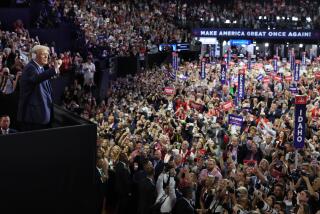Bush Campaign in Iowa Slowed by Iran Affair
- Share via
MASON CITY, Iowa — During six years of loyal service in the supporting cast of Ronald Reagan’s White House, Vice President George Bush has been studying his lines for the moment when he could assert his own political identity and begin his bid for the presidency.
Now that moment has come. And for Bush, who went before more than 3,000 Iowa Republicans last week in two grueling days of “Ask George Bush” sessions in seven cities, the circumstances could hardly be less auspicious.
Iran is the reason. Bush, who alone among the potential presidential candidates was present when the Reagan Administration made its ill-fated decision to sell arms to Iran, stands to lose the most from the developing scandal.
“When the chips were going the way they were, he wasn’t there,” said Daniel Musil, president of a manufacturing firm in Cedar Rapids, after listening to Bush. “It smells. It still does.”
For Bush, Iran has only compounded the problem faced by any vice president who tries to assert his own political identity: He cannot disavow the policies of the Administration he serves and--saddled with that burden--no incumbent vice president has won the top job since Martin Van Buren in 1836.
With Iowa Republicans, Bush’s approach to that problem was to line up squarely behind the President on the issues but to promise not to adopt Reagan’s detached, hands-off style of running the government. That style came under sharp criticism from the presidential commission that reported to Reagan on Feb. 26 on its inquiry into the Iran affair.
Fewer Iran Questions
“You have to be quite a bit hands-on,” Bush told Republicans in Waterloo, although “you can do a little too much micromanagement and lose the big picture.”
Despite the impact of the Iran issue, however, Bush and his strategists have taken heart that his audiences have asked less about Iran than a host of other issues--farm policy, education, arms control, Social Security and such issues as abortion and school prayer. At Waterloo, he had to bring up Iran himself.
Spreading Economic Woes
But some of those issues work no better for Bush than Iran. In particular, economic woes have spread from Iowa’s corn and wheat fields, which are in virtual depression, into almost every other area of the state’s economy.
Jim Latham, owner of a small Mason City camera store, told Bush: “Lately, sir, frankly, I’ve been missing scraping manure and hard Iowa black dirt off of my carpet. I miss it in my store.”
Altogether, the Republican Party activists invited to meet with Bush gave him a friendly, warm reception. These are the same Republicans likely to participate next February in the Iowa party caucuses, which are first on next year’s calendar of events aimed at selecting delegates to the presidential nominating conventions.
Still Front-Runner
And nationwide, Bush remains the front-runner for the Republican nomination.
But a Des Moines Register poll released last month showed Bush favored by only 28% of the state’s Republicans, behind the 33% for Sen. Bob Dole of neighboring Kansas. Nationally, only 32% of the respondents to a New York Times-CBS poll released last Sunday gave Bush a favorable rating, contrasted with 43% in January.
“A year ago, George had a 90% lock on the nomination,” said Rep. Jim Leach, an Iowa Republican who supports Bush and traveled through the state with him last week. “Today he is one of several serious candidates.”
Strong Suit Now Liability
The Iran scandal has made a liability of what Bush had hoped would be his strong suit--his foreign policy expertise as a former CIA director and U.N. ambassador. “Iran is hurting George Bush more than Ronald Reagan right now,” said Rep. Lynn Martin (R-Ill.), a friend of Bush who has not yet committed to a presidential candidate.
‘Bush’s Disadvantage’
George Wittgraf, a lawyer from Cherokee who is running Bush’s Iowa campaign, conceded that the Iran affair “has worked to George Bush’s disadvantage. . . . It has caused some people to wait longer to make a commitment, particularly in the case of George Bush.”
Others don’t care. Alvin Holst, a farmer and Reagan delegate at the 1980 Republican National Convention who attended the Bush session in Davenport, said of the drumbeat of Iran coverage on television: “I sometimes get tired of it and turn it off.”
Bob Buckley, who attended the meeting with Bush in Waterloo, added: “You’re in Iowa, and I think probably people are a little more understanding. People are tired of hearing about it. . . . He’s admitted (his mistakes) and he’s trying to get on to the future.”
Although the presidential commission on the Iran affair had little to say about any role that Bush may have played, the vice president expressed regret to Iowa Republicans that he did not stop it. “I wish I had seen signals and done something differently,” he told Republicans in Davenport. “I wish I had been more help in some ways.”
Credit for Accomplishments
That admission may make it difficult for the vice president to take credit for the Reagan Administration’s accomplishments. John Maxwell, an adviser to another presidential hopeful, Rep. Jack Kemp (R-N.Y.), who is third in polls of Iowa Republicans, said: “The greatest challenge is for Bush to reconcile the idea that he’s had a high profile in the White House” with his apparent lack of participation in the Iran arms sale decision.
Bush also accepted the presidential commission’s conclusion that the Administration, undercutting its own policy of refusing to bargain with terrorists, sold arms to Iran in hopes that hostages held by Iranian-supported terrorists would be released. That concession was particularly uncomfortable for Bush, who headed the Administration task force that developed the policy on terrorists.
Perhaps more important than the immediate damage that the Iran controversy has dealt to Bush’s standing in the polls, it has dulled the shine of invincibility on Bush’s campaign.
‘Cut to the Heart’
“The whole Iran situation cut to the heart of his candidacy,” an adviser to Kemp said. “For two years, Bush has tried to push the stone of inevitability up to the top of the mountain, (the idea that) people should be for George Bush because he is going to win.”
If Bush is going to win the Republican nomination, his supporters say he must make a strong showing in next February’s Iowa caucuses.
Seven years ago, he won a dramatic upset victory here, reaping more than 30% of the Republican vote in a field of seven candidates. Second-place finisher Ronald Reagan proceeded to trounce Bush in the New Hampshire primary, the second big event on the 1980 presidential calendar, and went on to the Republican nomination and the presidency.
Much of Bush’s 1980 organization still is in place and more than 2,300 Iowans have already pledged to work for the vice president. Such organization is particularly crucial in states like Iowa, where candidates are selected at caucuses of party activists rather than in primaries for all registered Republicans.
Not a Fresh Face
This time, however, Bush is no longer a fresh face in Iowa. Instead, said David Keene, Bush’s political director in 1980 but a Dole adviser this year, the vice president has a record to defend--and beyond Iran, he is certain to be held accountable for the Administration’s unpopular farm policy.
In Des Moines, Peter Brent, coordinator of a hot line called Prairiefire, told Bush that the new jobs created by an expanding economy during the Reagan Administration for out-of-luck farmers pay the minimum wage. “You can’t pay the rent for $3.35 an hour,” he protested. “What are you going to do to make the heartland of America wealthy, prosperous and feeling good again?”
Bush stood by the Administration’s farm policy and stressed free-market solutions. The only new twist he offered was massive use of corn to produce ethanol as an alternative to oil-based fuel--a course that Agricultural Department economist Gerald Grinnell last week called “a very inefficient way to raise farm income.”
Defining His Message
Bush’s partisans and detractors agree that he must define his own new message rather than rely on the support of those who regard him as Reagan’s loyal lieutenant and inevitable successor.
“There has to be an indication that he has a new vision of America in the 1990s, and that he has a different approach and style from Reagan,” said Rep. Tom Tauke (R-Iowa), who is working for Bush here.
The vice president has promised to sharpen the distinctions as he stumps the country in a series of commencement addresses this spring.
Thus far, however, he has provided only the outlines of a program that he says will center on “jobs and peace.” Asked how he would eliminate the federal deficit, for example, Bush called on Congress to meet the budget-balancing goals of the Gramm-Rudman law, which fiscal experts in Washington are increasingly dismissing as unrealistic.
Embarrassing About-Face
If Bush veers sharply from Reagan Administration policies, he risks reminding voters of his embarrassing 1980 about-face. After becoming Reagan’s vice presidential running mate, he embraced the same Reagan fiscal program that he had called “voodoo economic policy” as a presidential candidate. He also dropped his support for the equal rights amendment and took a more conservative stance on abortion.
Thus, the man who boasts one of the strongest resumes to be found in public life has found himself derided by cartoonist Garry Trudeau’s “Doonesbury” comic as having put his manhood into a blind trust.
Even conservative columnist George F. Will, one of the Administration’s staunchest defenders, last year called Bush a “lap dog.” Will wrote: “The unpleasant sound Bush is emitting as he traipses from one conservative gathering to another is a thin, tinny ‘arf.’ ”
For all of the President’s enduring popularity, Republicans say they want more from Bush than promises that he will carry on for Reagan.
“For him to follow the Reagan line--hook, line and sinker--is a losing effort,” said Fred Garwood, an attorney who attended a $250-a-plate Rochester, N.Y., party fund-raiser at which Bush spoke a few weeks ago. “Even if he gets the nomination, it won’t be worth anything.”
George Cefalu, a Rochester builder, added: “He has to be able to stand on what he believes the country should be doing.”
More to Read
Get the L.A. Times Politics newsletter
Deeply reported insights into legislation, politics and policy from Sacramento, Washington and beyond. In your inbox twice per week.
You may occasionally receive promotional content from the Los Angeles Times.










